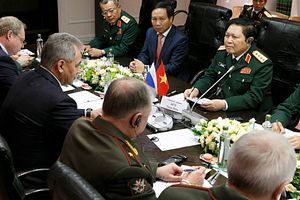While the official agenda of the visit of Vietnam’s powerful top party official to Russia last week was wide-ranging, the headlines that emerged out of that trip focused largely on the defense side, with suggestions that a billion dollars in military-related cooperation was in the pipeline between the two countries. Beyond the figure itself, the headlines put the focus on the defense activity that continues to occur between the two countries in spite challenges even as Hanoi engages newer partners such as the United States.
As I have noted before in these pages, Vietnam and Russia have a defense relationship that dates back to the Cold War and continues on today as Hanoi continues to modernize its military and Moscow seeks a stronger and more visible defense presence in the broader Asia-Pacific. That extends into military equipment as well, and Russia has traditionally been Vietnam’s biggest partner in this respect.
Both Hanoi and Moscow have had to manage challenges in their ties as Vietnam engages newer partners such as the United States and Russia flexes its muscles regionally and internationally. But the relationship continues to be significant, as evidenced by Hanoi’s purchase of six Kilo-class submarines from Russia over the past few years, and ongoing defense engagements thus far in 2018 where both sides have been discussing room for further collaboration as well (See: “Russia-Vietnam Military Ties in the Spotlight”).
Last week, the relationship was in the headlines again with the visit of Nguyen Phu Trong, the general secretary of the Vietnam Communist Party (VCP). Trong’s visit, which lasted from September 5 to 8, was cast in terms of the wider comprehensive strategic partnership both sides enjoy, and his engagements included meeting with top officials including President Vladimir Putin and Prime Minister Dmitry Medvedev, as well visits to landmarks such as the Vladimir Ilyich Lenin Mausoleum and the Statue of President Ho Chi Minh in Moscow.
Unsurprisingly, official statements out of Vietnam and state media cast the visit broadly in terms of strengthening the comprehensive strategic partnership between the two countries. And the official joint statement produced by the two sides included no less than forty points, highlighting the economic, people-to-people, and security aspect of bilateral ties as well as areas of convergence on regional and international issues.
But the headlines on the visit itself were on the defense side. No specific deals or announcements were officially made by the two sides during the trip beyond general statements in the joint statement, which spoke to both the quiet way in which collaboration is sometimes pursued as well as contemporary concerns, such as on U.S. actions with respect to Russia including the Countering America’s Adversaries Through Sanctions Act (CAATSA) which sanctions countries procuring weapons from Russia like Vietnam. But scrutiny was placed on the remarks of Dmitry Shugayev, the head of the Federal Service for Military-Technical Cooperation, who was reportedly quoted by Russian news agency TASS as saying that there was “a portfolio of orders worth more than $1 billion.”
That Vietnam is continuing its military ties with Russia is no surprise. Though much more media attention is often lavished on Vietnam’s expanding ties with newer partners such as the United States relatively speaking, Hanoi has continued to shore up its traditional relationships, including with Russia. That extends to the defense domain as well.
But at the same time, as I have noted before, such statements need to be treated with caution. While the billion-dollar figure makes for good headlines, it is difficult to assess the significance of Shugayev’s statement given that there were no additional details regarding this so-called “portfolio of orders,” including what the exact equipment and services are in question and what stage they are to actually coming to fruition.
In addition, an overly myopic focus on how much Vietnam is buying from Russia misses larger questions, such as the extent to which Vietnam’s mix of defense partners is gradually shifting over time, and how Hanoi is managing that shift in terms of its alignments with various actors. For that and more, one needs to look beyond statements such as the billion dollar boost (or boast) to Russia-Vietnam military relations.































